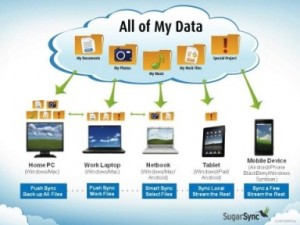 Gartner Special Research team conducted a study to identify how business enterprises plan to thrive in the coming years. Obviously, the cloud had significantly influenced how business strategies are done and how customer needs are met. Gartner released two reports that looked into the cloud computing trends; entitled, “The New PC Era: The Personal Cloud” and the “Consumer Research: Personal Cloud.”
Gartner Special Research team conducted a study to identify how business enterprises plan to thrive in the coming years. Obviously, the cloud had significantly influenced how business strategies are done and how customer needs are met. Gartner released two reports that looked into the cloud computing trends; entitled, “The New PC Era: The Personal Cloud” and the “Consumer Research: Personal Cloud.”
The traditional business IT solutions will soon be replaced by personal cloud by 2014 according to Gartner, Inc. Gartner projects that the personal cloud will revolutionize user experience because of its outstanding level of flexibility. This is as users become engaged with various computer devices in their daily activities whether in business or in personal computing.
In addition to this, the mobile cloud continues to entice users as it continues to leverage on its features, strengths and applications that are expected to improve user productivity and satisfaction levels.
Gartner’s Research vice president, Steve Kleynhans said, “Major trends in client computing have shifted the market away from a focus on personal computers to a broader device perspective that includes smartphones, tablets and other consumer devices. Emerging cloud services will become the glue that connects the web of devices that users choose to access during the different aspects of their daily life.”
Enterprises were left wondering for the past two years as to how client computing solutions will affect the market in the next five years, and what other developments will arise.
“Many call this era the post-PC era, but it isn’t really about being after the PC, but rather about a new style of personal computing that frees individuals to use computing in fundamentally new ways to improve multiple aspects of their work and personal lives,” said Kleynhans.
Driving Forces that Shape Cloud Computing Trends
Consumerization – several factors serve as precursors to the trend in information technology and how it has affected the user consumerization. Among the key factors include individual differences in technology expectations, social and Internet influences, various mobile device innovations, data availability and empowerment of consumers.
Virtualization – flexibility and scalability of IT organizations were significantly improved by virtualization. It has minimized irregular incidences as a result of application issues from various operating systems, processor architectures and a wide genre of devices. Virtualization has made it possible to allow applications and processes to integrate seamlessly in the emerging cloud computing world.
Applications – user design, delivery and consumption have dramatically changed the corporate environment and the business market. The emergence of various applications raised the need for better cross-platform portability and flexibility, user experience and powerful cloud-servers.
Self-Service Cloud – the cloud platform provided a new level of opportunity and empowerment to users. Users can now have the scalability and endless resources to accomplish their IT solution plans that are highly dependent on user choice of applications, content and services.
Mobility – the partnership of the mobile industry and the cloud can perform outstanding business and personal IT solutions. This is mainly from the mobile computing convenience and flexibility features. The other emerging mobile cloud user interface has made user experience very practical. Mobile features included touch-based aspects, complex interaction facilities, contextual and speech facilities and a huge level of freedom.
Mr. Kleynhans said, “The combination of these megatrends, coupled with advances in new enabling technologies, is ushering in the era of the personal cloud. In this new world, the specifics of devices will become less important for the organization to worry about. Users will use a collection of devices, with the PC remaining one of many options, but no one device will be the primary hub. Rather, the personal cloud will take on that role. Access to the cloud and the content stored or shared in the cloud will be managed and secured, rather than solely focusing on the device itself.”
Additional reports are to be released before the end of this month as Gartner releases its new analysis on its webinar entitled, “Personal Cloud and the $2T Consumer Market.”
Other than the reports from Gartner, cloud market continued increase in revenues has also made a point with the personal cloud. In particular, the Android market continues to top the mobile cloud market as it continues to design and develop new apps that are focused on excellent user computing experience. Among the highlights of the Android apps include the easy navigation tabs between several pages; background music plays while using other apps; the new file sharing system called webshare links, excellent photo viewer, accounts and password multiple saving setting and UI improvements for tablets.
Another personal cloud using Drobo with Pogoplug has features that will improve media streaming and file access and sharing. Drobo has excellent personal cloud features that are offered at such affordable cost; with Drobo, users can consolidate files without so much hassle by doing away with dealing with external drives, automatically protects stored files and data without the need for configuration to restore settings, heavily secured access points from any device, huge data storage system and various ways to seamlessly sync data between and across platforms.
The trend towards personal cloud may still have a lot of issues to consider like security and reliability, but, in spite of the questions and concerns it continues to make a strong breakthrough in IT computing solutions whether in personal or business aspects.